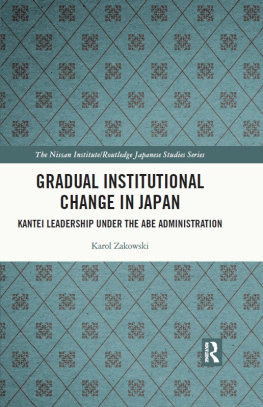
Japanese Political Economy Revisited
During the last 30 years, the Japanese political economy system has experienced significant changes that are usually not well understood or analysed because of their complexity and contradictions. This book provides new analyses and insights on the process of evolving Japanese political economy including Japan's current economic policy known as Abenomics. The first three chapters looks at evolutions at the corporate level, characterised in recent years by increasing firm heterogeneity. The authors apply theoretically driven analyses to the complex subject of corporate governance, human resource management and corporate reporting by discussing new developments in context of their economic opportunities as well as of their institutional contradictions with continuities in Japanese business practices.The second group of chapters deals with institutional changes and evolving economic reforms on the macro level of political economy. The two chapters focus on the financial system regulation and economic growth policies as two central elements of Japan's political economy and key drivers in the evolution of its economy. Their analysis allows us to better understand the interplay between reforms and change in consumption credit and to reinterpret Abenomics as a manifestation of ongoing contradictions within the Japanese political economy.
The chapters in this book were originally published as a special issue of Japan Forum.
David Chiavacci is Professor in Social Science of Japan at the University of Zurich, Switzerland. His recent publications include Social Movements and Political Activism in Contemporary Japan (Routledge 2018, co-edited with Julia Obinger) and Social Inequality in Post-groiuth Japan (Routledge 2017, co-edited with Carola Hommerich).
Sebastien Lechevalier is Professor at the Ecole des Hautes Etudes en Sciences Sociale, (Paris, France) and President of Fondation France Japon (http://ffj.ehess.fr/). His research interests lie from Asian capitalisms to issues related to the role of the state in development and welfare. His recent publications includes The great transformation of Japanese capitalism (Routledge, 2014) and Innovation beyond technology: Science for society and interdisciplinary approaches (2018, co-edited withYuko Fujigaki and Sandra Laugier).
Japanese Political Economy Revisited
Abenomics and Institutional Change
Edited by
DavidChiavacciand
SbastienLechevalier
First published 2019
by Routledge
2 Park Square, Milton Park, Abingdon, Oxon, OX14 4RN, UK
and by Routledge
711 Third Avenue, New York, NY 10017, USA
Routledge is an imprint of the Taylor & Francis Group, an informa business
Chapters 1-5 2019 British Association for Japanese Studies
Chapter 6 2017 Saori Shibata. Originally published as Open Access.
All rights reserved. With the exception of Chapter 6, no part of this book may be reprinted or reproduced or utilised in any form or by any electronic, mechanical, or other means, now known or hereafter invented, including photocopying and recording, or in any information storage or retrieval system, without permission in writing from the publishers. For details on the rights for Chapter 6, please see the chapter's Open Access footnote.
Trademark notice: Product or corporate names may be trademarks or registered trademarks, and are used only for identification and explanation without intent to infringe.
British Library Cataloguing in Publication Data
A catalogue record for this book is available from the British Library
ISBN 13: 978-1-138-60694-4
Typeset in Plantin
by RefineCatch Limited, Bungay, Suffolk
Publisher's Note
The publisher accepts responsibility for any inconsistencies that may have arisen during the conversion of this book from journal articles to book chapters, namely the possible inclusion of journal terminology.
Disclaimer
Every effort has been made to contact copyright holders for their permission to reprint material in this book. The publishers would be grateful to hear from any copyright holder who is not here acknowledged and will undertake to rectify any errors or omissions in future editions of this book.
Contents
David Chiavacci and Sbastien Lechevalier
Mitsuharu Miyamoto
Ryohei Nakagawa
Franz Waldenberger
Adrienne Sala
Saori Shibata
Guide
The chapters in this book were originally published in Japan Forum, volume 29, issue 3 (September 2017). When citing this material, please use the original page numbering for each article, as follows:
Chapter 1
Japanese political economy revisited: diverse corporate change, institutional transformation, and Abenomics
David Chiavacci and Sebastian Lechevalier
Japan Forum, volume 29, issue 3 (September 2017), pp. 299-311
Chapter 2
Change and continuity in Japanese corporate reform
Mitsuharu Miyamoto
Japan Forum, volume 29, issue 3 (September 2017), pp. 312-337
Chapter 3
Shareholding characteristics and imperfect coverage of the Stewardship Code in Japan
Ryohei Nakagawa
Japan Forum, volume 29, issue 3 (September 2017), pp. 338-353
Chapter 4
'Growth oriented'corporate governance reform - can it solve Japan's performance puzzle?
Franz Waldenberger
Japan Forum, volume 29, issue 3 (September 2017), pp. 354-374
Chapter 5
The Japanese consumer finance market and its institutional changes since the 1980s
Adrienne Sala
Japan Forum, volume 29, issue 3 (September 2017), pp. 375-398
Chapter 6
Re-packaging old policies? Abenomics' and the lack of an alternative groiuth model for Japan's political economy
Saori Shibata
Japan Forum, volume 29, issue 3 (September 2017), pp. 399-422
For any permission-related enquiries please visit:
http://www.tandfonline.com/page/help/permissions
David Chiavacci is Professor in Social Science of Japan at University of Zurich, Institute of Asian and Oriental Studies, Switzerland.
Sbastien Lechevalier is Professor at the cole des Hautes tudes en Sciences Sociale (Paris, France) and President of Fondation France Japon (http://ffj.ehess.fr/).
Mitsuharu Miyamoto is Professor at Senshu University, School of Economics, Tokyo, Japan.
Ryohei Nakagawa is Associate Professor at Kyoto University of Foreign Studies, Japan.
Adrienne Sala is Postdoctoral Researcher at University Paris 7 Paris Diderot, France.
Saori Shibata is Lecturer at Leiden University, Leiden Institute for Area Studies, The Netherlands.
Franz Waldenberger is Director of the German Institute for Japanese Studies, Tokyo, Japan.
DAVID CHIAVACCI AND SBASTIEN LECHEVALIER
Abstract: This introductory article to the special issue on "Japanese Political Economy Revisited: Diverse Corporate Change, Institutional Transformation, and Abenomics" starts with a short summaryof the changing perceptions of Japan's political economy from its meteoric rise as worldwide leading model in the 1970s and 1980s to its demotiontoa problem and reform case since the later 1990s. Based on this overview, it identifies some striking issue and open questions in this conventional view of Japan's political economy as problem and the high expectations on Abenomics as Japan's current economic reform programme. Then we discuss the articles of the special issue and their new contributionsto a better understanding of the developments at the corporate level as well as institutional change and economic reforms at the macro level in the last two decades. Finally, this introductory article ends with a short outlineof a new research programme and four central research questions about the Japanese political economy.









